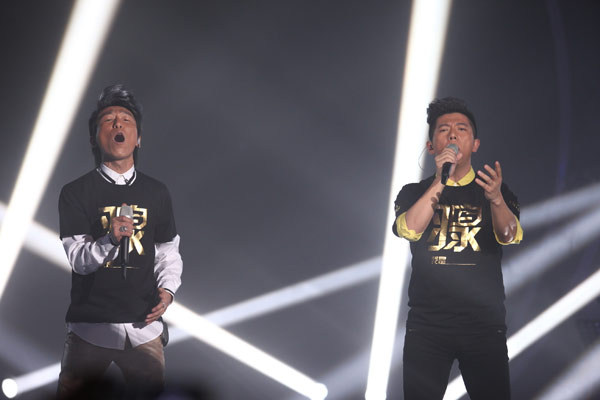Satellite channels are spending record amounts on talent shows despite government curbs on entertainment broadcasting, Han Bingbin reports.
Despite the official cap on entertainment programming during prime time, China's satellite channels are spending huge amounts of money on reality shows to win viewers. While the ongoing high-diving shows, Stars in Danger produced by Jiangsu Satellite TV and Celebrity Splash produced by Zhejiang Satellite TV, have provoked heated discussions about dress codes and star safety, people have been immersing themselves in the nostalgic atmosphere of I Am A Singer, the celebrity singing competition which has been Hunan Satellite TV's great success.
 |
|
Contestants gather to attend the final of Hunan Satellite TV's show, I Am A Singer. [Photo/CFP] |
Hunan, Jiangsu and Zhejiang are the big three, but the other satellite channels in the top 10 are also spending heavily on reality shows so they don't get left behind.
"You can hardly imagine the ambition of second-tier channels, such as Hubei. Their devotion to program development and marketing is visible. It's no longer the romance of the Three Kingdoms, we're about to enter the period of the Warring States," said Xu Jifeng, deputy director with the chief editor's office at Zhejiang Satellite TV.
To win attention for their forthcoming Super Star China, Hubei Satellite TV recently spent 630,000 yuan ($101,000) on a commercial slot during I Am A Singer.
The advert featured someone yelling: "I am not a singer, I am superstar China."
Super Star China is the name of the reality talent show Hubei is about to launch. The station made a record-breaking investment of at least 60 million yuan in the show.
The commercial was unconventional and controversial, but Zheng Xuan, director of the program research center at Hubei Satellite TV, said it was both reasonable and worthwhile. "After you enter the top 10, it's extremely hard to move up even one place," Zheng said. "The only way to get ahead is large-scale reality shows," .
The top three are not slowing down, and that is putting the pressure on the other TV stations.
"The top three's investment is nothing the rest of us can match, but whatever the risk is we have to try, otherwise we'll get left behind," Zheng said.
Hunan was the early pathfinder for light entertainment in China, and it has produced some of the most popular television shows over the last decade. In 2005 it launched Super Girls, a reality singing contest that became a national craze, propelling the channel to the top of the TV hierarchy.
But Jiangsu Satellite TV fought its way to the top in 2010 with the immensely popular dating show You Are the One, only to lose the crown to Zhejiang Satellite TV's The Voice of China, which was last year's most popular reality show.
In early 2012, when Hunan's national ratings had dropped to No 18, the station leaders called an emergency meeting where, rumor has it, they sang The Internationale to raise morale. Whether it's true or not, everyone at Hunan obviously rallied to the cause. After I Am A Singer, Hunan launched the much-anticipated remake of The X-Factor featuring new pop king Eason Chan and controversial film star Zhang Ziyi, and it has announced the comeback of Super Boys, the twin show to Super Girls.
"I Am A Singer has played a leading role and laid a good foundation for us. The X Factor will carry it forward and we will try to make it the ultimate music reality show," said Li Hao, deputy director of Hunan Satellite TV.
However, the other satellite companies are not just going to sit back and watch that happen, Zhejiang will soon air the second season of The Voice of China, and a twin show provisionally called Songs of China.
 |
|
Chinese pop duo Yu Quan, comprising Chen Yufan (left) and Hu Haiquan, compete in Hunan Satellite TV's popular singing show, I Am A Singer. [Photo/CFP] |
And it is not just the top 10 channels that are launching new shows. Almost every major satellite TV channel is planning to introduce a new reality show, according to Hubei Satellite TV's Zheng Xuan.
As well as Hubei's Super Star China, Shanghai-based Dragon TV is due to launch a star-studded Chinese Idol, and Anhui Satellite TV is about to launch its 80-million-yuan celebrity singing competition Mad for Music. Even the more "serious" China Central Television recently launched a celebrity dancing show Dance Out Of My Life that's broadcasting during prime time.
"Reality shows are still the big draw," Li said.
And as these shows with budgets of hundreds of millions of dollars are being broadcast one after another China's TV industry has entered what many are calling a money-burning era.
And this is despite the restriction imposed by the State Administration of Radio, Film and Television in 2011, which limited the country's 34 satellite channels to 90 minutes of entertainment broadcasting twice a week during prime time, in order to curb TV shows of "excessive entertainment" and "low taste".
"If stations don't have their own reality shows, they'll have a shortage of star resources for the year-end gala," Zheng said. "So the profit growth of a TV station largely relies on celebrities."
The year-end galas have become a new battlefield where major satellite channels bring together celebrities to try to win the most viewers. Involving celebrities in reality shows and star-making grassroots talent competitions help build a station's star support. To this end, both Hunan's Super Girls and Zhejiang's The Voice of China have proved enormously beneficial.
Related reading:
Learning to stand out from the crowd
|
|
|
|
|
|
|
|
